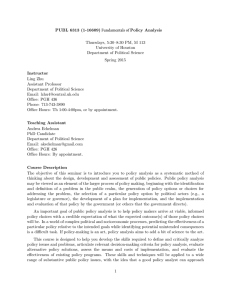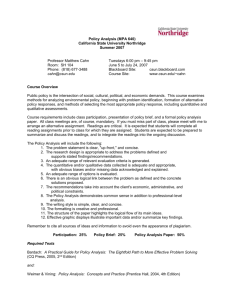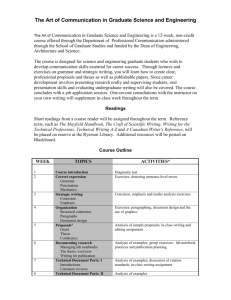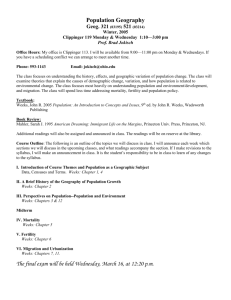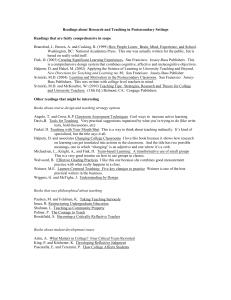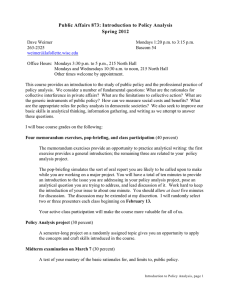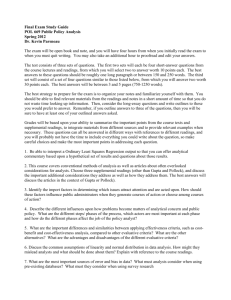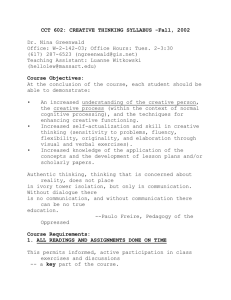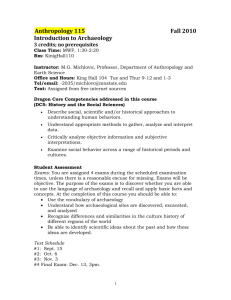PSC 751 syllabus - University of Nevada, Reno
advertisement
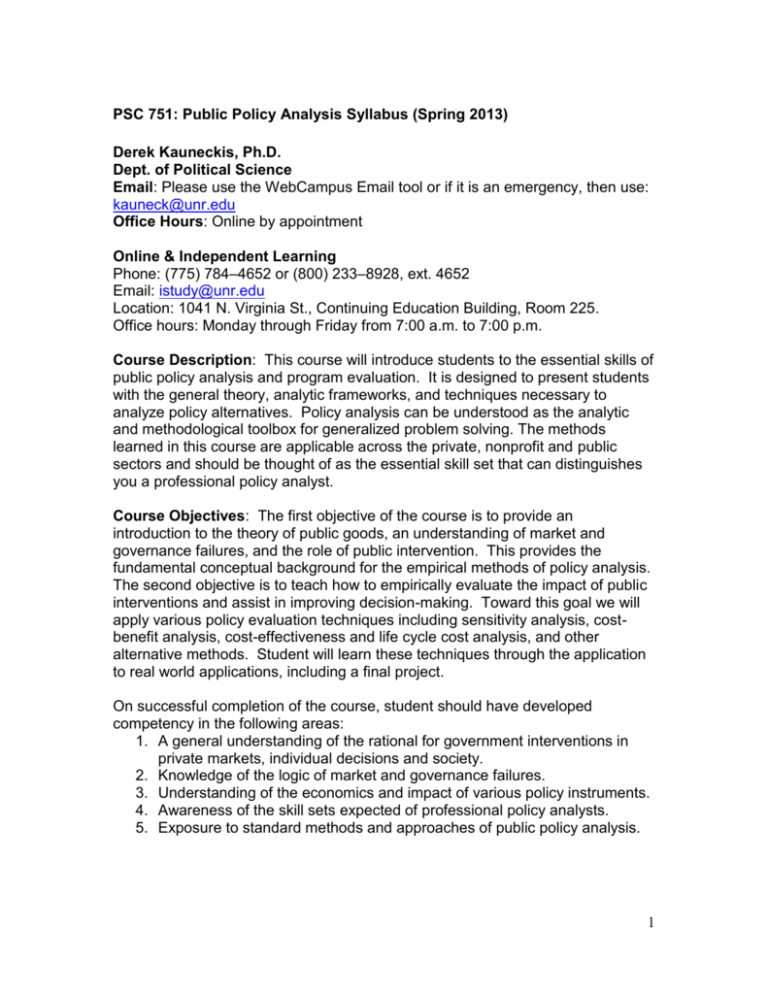
PSC 751: Public Policy Analysis Syllabus (Spring 2013) Derek Kauneckis, Ph.D. Dept. of Political Science Email: Please use the WebCampus Email tool or if it is an emergency, then use: kauneck@unr.edu Office Hours: Online by appointment Online & Independent Learning Phone: (775) 784–4652 or (800) 233–8928, ext. 4652 Email: istudy@unr.edu Location: 1041 N. Virginia St., Continuing Education Building, Room 225. Office hours: Monday through Friday from 7:00 a.m. to 7:00 p.m. Course Description: This course will introduce students to the essential skills of public policy analysis and program evaluation. It is designed to present students with the general theory, analytic frameworks, and techniques necessary to analyze policy alternatives. Policy analysis can be understood as the analytic and methodological toolbox for generalized problem solving. The methods learned in this course are applicable across the private, nonprofit and public sectors and should be thought of as the essential skill set that can distinguishes you a professional policy analyst. Course Objectives: The first objective of the course is to provide an introduction to the theory of public goods, an understanding of market and governance failures, and the role of public intervention. This provides the fundamental conceptual background for the empirical methods of policy analysis. The second objective is to teach how to empirically evaluate the impact of public interventions and assist in improving decision-making. Toward this goal we will apply various policy evaluation techniques including sensitivity analysis, costbenefit analysis, cost-effectiveness and life cycle cost analysis, and other alternative methods. Student will learn these techniques through the application to real world applications, including a final project. On successful completion of the course, student should have developed competency in the following areas: 1. A general understanding of the rational for government interventions in private markets, individual decisions and society. 2. Knowledge of the logic of market and governance failures. 3. Understanding of the economics and impact of various policy instruments. 4. Awareness of the skill sets expected of professional policy analysts. 5. Exposure to standard methods and approaches of public policy analysis. 1 Prerequisites: Eligibility to enroll in graduate level Political Science courses or enrollment in the Graduate Renewable Energy Certificate Program. (ENGR 600 Alternative Energy Fundamentals is the recommended pre or co-requisite course for this course.) Required Texts: There are three (2) textbooks and one (1) workbook required for this course as well as various individual readings. Weimer, D. and A. Vining (2010), Policy Analysis: Concepts and Practice (5th ed.), Prentice Hall, N.J., ISBN: 978-0205781300. Gupta, D. (2011), Analyzing Public Policy: Concepts, Tools, and Techniques (2nd ed.), CQ Press, D.C., ISBN: 978-1-60426-570-5. Federal Highway Administration, Office of Asset Management, “Life Cycle Cost Analysis Primer" (FHWA IF-02-047). Available for free: http://isddc.dot.gov/OLPFiles/FHWA/010621.pdf Readings and Lectures: Lecture notes posted online are designed to supplement the assigned readings, not replace them. I believe it would be an insult to your intellectual capacity to merely repeat what can be found in the assigned readings. It is expected that you have done the readings before referencing the lecture notes since they merely add additional material, explanation and discussion. Some of the assigned readings (particularly Weimer and Vining) are designed for advanced graduate students with backgrounds in economics and statistics. Do not worry if you don’t understand some of the graphs and mathematics. The lecture notes will walk you through what you need to know for this class. Additional Materials: The textbooks are the primary source for the class. If supplemental material is needed, it will be provided via electronic course reserve or be available on the internet. You can access electronic reserves by clicking on the “Electronic Reserves” button on the course menu. Student Expectations: This course is designed to be a graduate level class in public policy analysis offered online. This implies a number of things that are important to you as a student. First, I assume you are interested in the material, or otherwise you would have taken a different course in this series. As a graduate course, is expected that you come with a fair amount of individual initiative and self-motivation. This means that if terms or concepts are unfamiliar, and you are unable to understand the material from the book, that you we be able to initiate conversations with other students and conduct the necessary work outside the class to understand the material. Additionally, you should be aware that the readings for this course are at a relatively high level and intellectually demanding. While it is not essential that you understand all the material presented in the readings (some of which requires a background in economics) 2 you should be able to summarize the key important points from each reading. The lecture notes will provide supplemental explanations of the material covered in the readings when needed, but it is critical that you have wrestled with the concepts from the readings first, before referring to the lecture note. Finally, as graduate students you bring additional professional experiences that undergraduate students typically to not have. I highly encourage you to draw on these experiences for understanding the course material and in discussions with fellow students. Instructor Expectations: As an instructor for this course, my responsibilities include providing engaging and relevant material to discuss, direction and feedback on ideas presented in class, and treating each student with fairness and respect. I will attempt to respond to questions in a timely manner. Coursework: Because there are multiple types of students enrolled in the course, there are a number of options available to each of you in terms of how you choose to illustrate your command of the material. Students enrolled in a regular graduate degree program on campus have two options: (A) Exercises 1, 2, 3, 4, 5; two exams; Course Project (Option I) (B) Exercises 1, 2, 3, 4, 5; two exams; Course Project (Option II) This permits more flexibility in your scheduling, engaging other students, and the substantive topic of the paper. GREC students do not necessarily have to do a research paper on a topic of renewable energy. As mentioned earlier, these are generalized tool skills that can be applied to any topic, so once learned they are useful across a broad array of applications. Graduate Renewable Energy Certificate (GREC) students have three options in terms of workload: (C) Exercises 3, 4, 5 and two exams (D) Exercises 1, 2, 3, 4, 5; one exam; Course Project (Option I) (E) Exercises 1, 2, 3, 4, 5; one exam; Course Project (Option II) GREC students should select the coursework option (C, D, or E) you prefer by the third week of class. The first assignment is a submission of a paper topic, so if I have not received it from you by the due date, you will default to option C. 3 Exercise 1: Paper Topic, A one-page abstract of your final class paper topic and selection of 10 sources. Due: End of week 2 Value: 50 points Exercise 2: Paper Literature Review, A two-page literature review of your paper topic. Due: End of week 4 Value: 100 points Exercise 3: Policy Analysis Process and Goals, A practice exercise applying a political feasibly analysis. Due: End of week 6 Value: 100 points Exercise 4: Cost Benefit Analysis, A series of exercises aimed at applying the basic skills needed for cost benefit analysis and understanding the logic of discounting. Due: End of week 7 Value: 100 points Exercise 5: Life Cycle Cost Analysis, A short exercise constructing a life cycle cost analysis for a hypothetical project. Due: End of week 8 Value: 100 points Course Project Due: April 20, 6:00 pm Value: 200 points Option I - Group Policy Analysis Project: This option is the more interesting of the two writing projects. While there is less individual writing involved, it does require more coordination with other students and doing a real policy analysis project document. The group will need to find a client in the community and apply the skills from class to a real work policy problem. While grades will be assigned based on individual contribution, designated tasks, and peer evaluations of your work, there is typically more work involved in group projects. However getting to work on a real policy issue does make the experience more rewarding, as well as exposes you to aspects of policy analysis in the local community, and provides an example of a project you can add to your resume. If you choose paper option I, you will each be responsible for writing one section of about 6 pages, have a group responsibility assigned to, and need to complete a professional policy analysis report. The size of the final project will depend on the size of the student group (4 students would need to submit something about 24 pages, plus tables and graphs). Option II - Single Authored Policy Brief: Twenty page research paper on the topic of your choice. A more detailed literature review will be expected from any non-GPRE student. GPRE students are permitted to use more literature from 4 their professional fields (reports, internal documents, etc.) while students in degree granting programs on campus are expected to utilize more of the academic research literature. Note: Late assignments are not accepted. Weekly Online Discussions: Your original discussion posting is due by 11:59 p.m. (PST) on Wednesdays. Your responses to classmates’ postings are due by 11:59 p.m. (PST) on Saturdays. Value: 20 points each (see Discussion Rubric and examples of evaluation at end of syllabus) Late postings/responses will not be evaluated. The discussion board in this course is designed with three goals: first, to help you digest the reading material through the discussion questions offered at the end of each module; second, to have you apply the material in the books to renewable energy issues you are dealing with as energy professionals by offering examples, issues in the media for class discussion, and case studies from your local jurisdiction; third, to allow you the opportunity to get to know one another and develop a professional network of renewable energy professionals. In order to reach these goals it demands attention to specific aspects of your answers to the discussion questions. Please remember that these are intended to be discussions among students, with only occasional intervention by the instructor, not a discussion with the instructor. Also, keep in mind that you need to offer both an initial posting of your own, as well as at least one response to another student’s posting. This is intended to make this an actual discussion not merely a Q&A session online. Finally, and most importantly, keep in mind that I will be reading your original postings as mini-essays, and that they represent the written component for the class. Discussion question responses should also be written with the same care, quality and forethought as a written paper. As the instructor for this course, I will occasionally intervene to answer specific questions and steer the conversation in the right direction, but as graduate students you are expected to be independent learners and use all the resources at your disposal, including your peers and outside resources as needed. To help you reach these goals, a Discussion Rubric (see Weekly Online Discussions on the WebCampus Syllabus page) will be followed very closely in assigning grades for each week’s discussion board postings. 5 Examinations: Progress Test I: week 5 Proctored Final Exam: week 10 Value: 200 points each The questions for the Progress Test I and the Proctored Final Exam will closely resemble those drawn from the questions at the end of each chapter. Thus it is highly encouraged that you work through the questions at the end of the text chapters on your own as practice for the exams. You are encouraged to work together on these questions and actively discuss them in the online forums. Progress Test I: The format for the Progress Test I will be multiple choice, and are typically composed of about 50 questions, worth two-points each. The first exam covers primarily conceptual material on public goods theory and public policy. It is timed and you will have one hour to complete it. I’ve been told my multiple choice exams are difficult, so please do study accordingly. Proctored Final Exam: The final exam is not comprehensive, and will focus on material from the second half of class (i.e. applying the tools of CBA, life cycle analysis, discounting and others). While the majority of the exam is multiple choice, it will contain a short written section that will mimic the format of the weekly written assignments. The Final Exam is proctored through an online proctoring service called ProctorU and must be taken at an assigned time. Remember, you must make arrangements with Online & Independent Leaning in advance to take final exam; see the Final Exam page for details on scheduling the final exam. 6 Grading Student grades will be awarded based upon your performance on the aforementioned course requirements. Depending on the enrollment status of the student, one of five point distributions is possible. You must select their option by the due date of the first assignment. Students enrolled in regular graduate programs have three options: A) Exercises 1, 2, 3, 4, 5; two exams; paper option I B) Exercises 1, 2, 3, 4, 5; two exams; paper option II OPTIONS A & B Assignment Points % of Total* Weekly discussions (Nine worth 20 points each) 180 14.6 Assignment 1: Paper Topic 50 4.1 Assignment 2: Paper Literature Review 100 8.1 Assignment 3: Policy Analysis Process and Goals 100 8.1 Assignment 4: Cost Benefit Analysis 100 8.1 Assignment 5: Life Cycle Cost Analysis 100 8.1 Course Paper 200 16.3 Progress Test 1 200 16.3 Final Exam 200 16.3 Total Possible 1230 GPRE students have three options in terms of workload: (C) Exercises 3, 4, 5 and two exams, (D) Exercises 1, 2, 3, 4, 5; one exam; paper option I (E) Exercises 1, 2, 3, 4, 5; one exam; paper option II OPTION C Assignment Weekly discussions (Nine worth 20 points each) Assignment 3: Policy Analysis Process and Goals Assignment 4: Cost Benefit Analysis Assignment 5: Life Cycle Cost Analysis Progress Test 1 Final Exam Total Possible Points 180 100 100 100 200 200 880 % by Total* 20.5 11.7 11.7 11.7 22.7 22.7 7 OPTIONS D & E Assignment Points Weekly discussions (Nine worth 20 points each) 180 Assignment 1: Paper Topic 100 Assignment 2: Paper Literature Review 100 Assignment 3: Policy Analysis Process and Goals 100 Assignment 4: Cost Benefit Analysis 100 Assignment 5: Life Cycle Cost Analysis 100 Course Paper 200 Progress Test 1 or Final Exam 200 Total Possible 1080 % by Total* 16.7 9.3 9.3 9.3 9.3 9.3 18.5 18.5 Grade Scale: The following scale will be used to determine letter grades: A 95–100% A- 90–94.9% B+ 87–89.9% B 83–86.9% B- 80–82.9% C+ 77–79.9% C 73–76.9% C- 70–72.9% D+ 67–69.9% D 63–66.9% D- 60–62.9% F below 60% 8 Semester at a Glance (Note that each week begins on a Sunday and ends on Saturday at midnight.) Week/Dates Week 1 Learning Modules Module 1: What is Public Policy Analysis? Assignments Weimer & Vining, Ch. 1 “Preview: The Canadian Salmon Fishery” & Ch. 2 “What is Policy Analysis?” Gupta, Ch. 1 “Reason, Rationality and Public Policy”, Ch. 2 “The Policy Analysis Process”. Week 1 Discussion Week 2 Module 2: The Basic Market Model Weimer & Vining, Ch. 4, “Efficiency and the Idealized Competitive Model” Gupta, p. 47-52. Week 2 Discussion Ex. 1: Submit paper topic idea (and read Gupta, Appendix A: Example of a Policy Analysis Report, p. 389-411). Week 3 Module 3: Market Failures Weimer & Vining, Ch. 5 “Rationales for Public Policy: Market Failures”, Ch. 6 “Other Limitations of the Competitive Market” Gupta, p. 52-62. Week 3 Discussion Week 4 Module 4: Non-Market Values and Government Failures Weimer & Vining, Ch. 7 “Distributional and Other Goals”, Ch. 8 “Limits to Public Intervention: Government Failures” Gupta, p. 62-73. Week 4 Discussion Assignment 2: Policy Project Literature Review 9 Week 5 Week 6 Weimer & Vining, Ch. 9 “Policy Problems as Market and Government Failure”, Ch. 10 “Correcting Market and Government Failures: Generic Policies” Module 5: Policy Instruments Week 5 Discussion Progress Test I Module 6: Weimer & Vining, Ch. 3 “Toward Professional Policy Goals, the Ethics”, Ch. 11 “Adoption”, Ch. 12 Public Policy “Implementation”, Ch. 15 “Landing on Your Process, and the Feet: Organizing your Policy Analysis” Role of the Policy Analyst Gupta, Ch. 4, p. 75-98, Ch. 5, p. 101-128, Ch. 15, p. 373-387 Week 6 Discussion Ex. 3: Policy analysis process and goals Week 7 Weimer & Vining, Ch. 16 “Benefit-Cost Analysis”, Ch. 17 “When Statistics Count: Revising the Lead Standard for Gasoline”. Module 7: Cost benefit analysis Gupta Ch. 14, p. 345-370. Week 7 Discussion Ex. 4: Cost-benefit Analysis Week 8: Mar. 24-30 Module 8: Life-cycle cost analysis Federal Highway Administration, Office of Asset Management “Life Cycle Cost Analysis Primer”. Week 8 Discussion Ex. 5: Life Cycle Cost Analysis Week 9: Mar. 31 – Apr. 6 Module 9: Projections, Prediction and Change Gupta Ch. 10, Ch. 11, Ch. 13, p. 225-343. Week 9 Discussion Proctored Final Exam Final Course Project Due 10 Academic Honesty: Individual responsibility is one of the key aspects of independent learning. It is important that the student adhere to a personal code of ethics in the completion of the course lessons. Discussion of the lesson materials with other students is encouraged, but all work submitted must be your own. Anyone caught violating this university regulation will be subject to disciplinary action as stated in the Academic Standards section of the General Catalog at the University of Nevada, Reno. A violation may result in your failing the course. Civility: Students are expected to conduct themselves in a civil manner at all times and in all forums. Students are responsible for contribute to the maintenance of a campus environment that fosters intellectual curiosity and diversity. That means respectful engagement with differing opinions and views. Harassment of one individual by another—in person, via e-mail or in electronic discussions—is uncivil behavior, which discourage the open expression of ideas on academic subjects. Independent Learning and the university are committed to an orderly learning environment that protects the right of free speech, and do not tolerate personal intimidation of any kind. Class Conduct: With recommendation of the instructor and approval of the college dean students may be dropped from class at any time for negligence or misconduct. Students may also be dropped for non-attendance upon indication of the instructor. Non-attendance in an online class consists of one or more of the following: Not logging into the WebCampus course on at least a bi-weekly basis, not working on and submitting assignments on a weekly basis and not participating in discussion questions by the dates assigned. Equal Access: The Independent Learning Program supports providing equal access for students with disabilities. Any student with a disability needing academic adjustments or accommodations is requested to contact the Independent Learning Office or the Disability Resource Center at the University of Nevada, Reno, as soon as possible to arrange for appropriate accommodations. Disability Resource Center/0079 University of Nevada, Reno Reno, NV 89557 (775) 784-6000 http://www.unr.edu/stsv/slservices/drc/ Online and Independent Learning/0050 University of Nevada, Reno Reno, NV 89577 (775)784-4652 or (800) 233-8928 http://www.istudy.unr.edu 11
